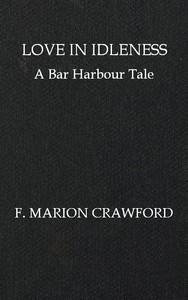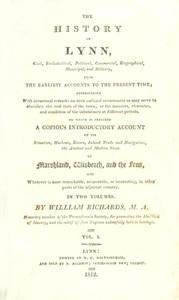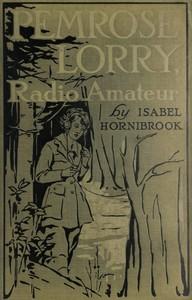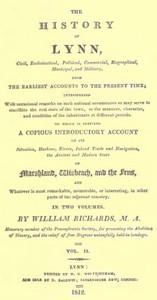Read this ebook for free! No credit card needed, absolutely nothing to pay.
Words: 203218 in 32 pages
This is an ebook sharing website. You can read the uploaded ebooks for free here. No credit cards needed, nothing to pay. If you want to own a digital copy of the ebook, or want to read offline with your favorite ebook-reader, then you can choose to buy and download the ebook.
Site of Lynn--Account of its harbour, and that of Wisbeach--Ancient and present state of its rivers--Inland Navigation--Drainage--Projects of improvement--State of its shipping, commerce, and population, at different periods.
The Haven or Harbour is capacious, but the entrance to it is accounted somewhat difficult, and even dangerous, owing to the numerous sandbanks, and the frequent shiftings of the channel, occasioned by the loose and light nature of the sandy and silty soil at the bottom. On which account it is not deemed safe for ships to go in or out without pilots, who are, or ought always to be well acquainted with the variations and actual state of the channel. In the ages proceeding the 13th century this harbour, compared with its present width, is said to have been very narrow, being only a few perches over, though its depth of water was then, probably, no less, if not greater than it is at present.
As Lynn owes most of its consequence to this river, which forms its communication with the sea, and gives it so great an extent of inland navigation, and consequently such a vast commercial intercourse with the interior parts of the country, it will not be improper here to give some account of it, together with its principal branches, or those tributary streams which render it so considerable among the British navigable rivers.
This river "does not improve much," "as it traverses the plain counties of Bedford and Huntingdon, though it adds some consequence to their capitals, being there navigable; at St. Ives it sinks into those great marshes which abound on this part of the eastern coast, through Norfolk, Huntingdonshire, Cambridgeshire, Northamptonshire and Lincolnshire.
"A dreary tract of Marsh accompanies these united rivers to Downham in Norfolk; nor does the country much improve afterwards, but the channel becomes very considerable, and the exit of these rivers is splendid, where the flourishing port and great trade of Lynn present a croud of vessels."
Dull and uninspiring, and in no sense classical ground, or a favourite haunt of the muses, as the banks of the Ouse have been generally, and perhaps justly considered, it must not be forgotten that they are become of late entitled to no small portion of celebrity, by the distinguished productions of the ingenious and excellent COWPER, one of the best, if not the very best of all our English poets of these latter days. He spent the greatest part of his time, and composed most of his works in the vicinity of this river. Henceforth it may therefore be deemed a classic stream: but it will be long, perhaps, before its banks shall have again the honour of numbering among their inhabitants a poet or a man of equal worth, genius, or renown.
What diverted this river from its ancient and original course is said to have been a great inland flood, which, meeting with obstruction, choked up the channel broke over the banks, and deluged the fens to a vast extent; from the effects of which they have never been fully recovered to this day.
This flood so deprived of a passage to the sea by the usual channel, and consequently overflowing the adjacent country to a great depth, became a most grievous and ruinous annoyance to the Fen people. At last, in order to remove so unbearable and terrible a nuisance, instead of taking common sense for their guide, and following nature, by opening the channel to the ancient outfall at Wisbeach, they determined, seemingly, to force nature, and set common-sense at defiance, by opening a passage for the inundating waters, and consequently for the future course of the great Ouse, the Cam, and the Larke into the narrow bed of the lesser Ouse, from Little-port Chair to Priests Houses, across that ridge, or higher ground, by which nature seemed to have forbidden the union of these rivers.
Things appear to have continued pretty much in this favourable state, till sometime after the erection of the Sluices at Denver; which by preventing the tides from going further up into the country, as before, proved very prejudicial to the harbour and Navigation of Lynn; and the effects are felt, it seems, and much complained of to this day. The free admission of the tides, and the natural course of the freshes are said to have kept other rivers open and navigable; and this appears to have been the case with the Ouse itself, while it possessed those advantages, or till the adventurers erected the said sluices across its channel, which are thought to have proved so very prejudicial, not only to the navigation of Lynn, Cambridge, &c. but even to the draining of the Fen districts and Marshland.
It seems allowed on all hands that Lynn Harbour has grown much worse in the memory of the present inhabitants, and that it is daily getting more and more so. To remedy this growing and alarming evil, as well as to promote and facilitate the inland navigation and drainage of the Fen Districts, a project was formed some few years ago to open a straight cut from Eabrink, about three miles above the town, into the upper part of the said harbour, with the view of scouring, deepening, and improving the same; and an Act of Parliament was obtained for that purpose. The work however, has been hitherto postponed: it being, it seems, found difficult to raise a fund adequate to the occasion. Vast benefits are said to be confidently expected by many from the execution of this project; while others appear much less sanguine in their expectations, and even consider it as in no small degree dubious and problematical.
Between Mr Kinderley and Mr Badeslade there seems to have existed a considerable difference of opinion on some points. The former ascribed the increasing foulness and decay of Lynn Harbour to the increasing width of the channel below, the loose and light nature of the sand there, subject to the powerful action of the tides, continually driving up those sands and lodging them in the harbour and river above: whereas the latter seems to ascribe it chiefly, if not solely to the Sluices, or the obstruction which they occasioned to the free influx and efflux of the waters. Each writer supports his own opinion with great confidence; but the question remains undecided. Both of them, perhaps, might be right in many or most of their ideas and reasonings.
Of Marshland and the adjoining parts, or Great Fen Country.--View of their situation and revolutions in remote ages, or Sketch of their ancient history.
Free books android app tbrJar TBR JAR Read Free books online gutenberg
More posts by @FreeBooks

: Love in Idleness: A Bar Harbour Tale by Crawford F Marion Francis Marion - Love stories; Bar Harbor (Me.) Fiction


: An epitome of astronomy with the new discoveries including an account of the eídouraníon or transparent orrery by Walker William Walker A Adam Contributor - Astronomy; Astronomical models







